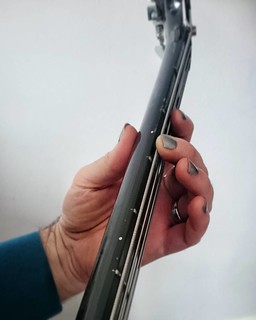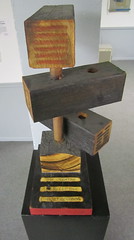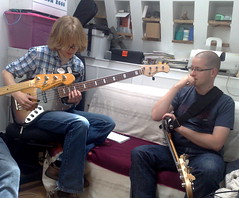In the last post, I mentioned that my main aim when teaching is to instill in my students a love of learning. A huge part of me having a right to teach them anything is me respecting the music they listen to. Nothing is a bigger turn off for a student that a dismissive teacher.
At one college I used to teach at, I got hauled over the coals by the head of the place for not giving my drum students a transcription of the parts we were working on when I was teaching them some reggae. “But they’ll never have to read reggae!” was my response. Doesn’t matter, was the come-back, they expect a transcription, it’s a music school and we’re meant to be getting all academic on their asses.
I didn’t give them a transcription. Why? Because Reggae is folk music. It’s an oral tradition, with musicians learning by listening and playing. None of the great reggae bands played off written parts, especially the drummers, and the nuance in the feel and timing in reggae drums would be impossible to notate. To give drummers a score to learn reggae would be like making them listen to Break My Stride by Matthew Wilder as an example of authentic reggae. It would sell them short, ill-prepare them for playing reggae professionally, and would be lying to them about how the great musicians who play that style learn to play like that.
The only place one is ever going to need to read a reggae drum part would be a theatre pit, and even then it’s more likely to just say ‘reggae feel’ or even more patronisingly ‘island feel’…
See, academics in general don’t deal well with folk traditions, especially not contemporary forms of folk music like reggae, punk, hip-hop… the magic in any of those styles is in the subtlety, not in the stuff that can be conveyed on a score. Handing out written bass-parts to ‘Anxious MoFo’ by the Minutemen or ‘Maxwell Murders’ by Rancid isn’t going to make your punk student a better punk player, but getting them hooked on Mike Watt or Matt Freeman’s playing might… That’s not to say they wouldn’t both make a cool transcription exercise as a way of introducing your lil’ punks to the wonders of writing music, but scores are not generally the way that material is passed around in the punk world, and to suggest that it is is disingenuous.
I’m not into lying to my students – I don’t want to make things easy for myself by selling them short on what’s going on with the music they listen to or want to play. If their aim is to be a rock star, I’ll tell them
- just how unlikely it is,
- how unpleasant an experience the road to ‘rock stardom’ is for most people and
- how much better off they can be playing the music they love, finding an audience for it, and letting the ‘lottery of stardom’ bit happen by itself…
What I do want is to teach them
- how to practice actual music – not just getting good at exercises
- how to listen and dissect the mechanics of what’s going on in the music they love,
- how the musicians they admire get to where they are (one of the beauties of having written for a bass mag is I’ve met and interviewed many of my students favourite players – always handy when I’m asked about a particular tune or technique 🙂 )
If I have students who play punk rock, I want to teach them the very best information I can about the world of punk rock, I want to show them how the great punk bassists get their sound, I want to introduce them to the music of the punk pioneers, the influencers of the genre, the attitude behind it… There’s nothing sacrilegious about transcribing punk basslines, but like reggae it’s largely an oral, experiential tradition – turning up to an audition for a punk band with a music stand and pile of manuscript is going to get you laughed out of the room…
As I said before, Context is everything, and there’s no reason to teach out of context, or lie about the context in order to try and shoe-horn one specific set of musical skills into a style that doesn’t require them…
Are there other artistic disciplines that have been spoilt by being “over-taught”? Does this happen with poetry and visual art, that the ‘academicization’ of it misses the mark for large sections of the discipline? Thoughts please…





